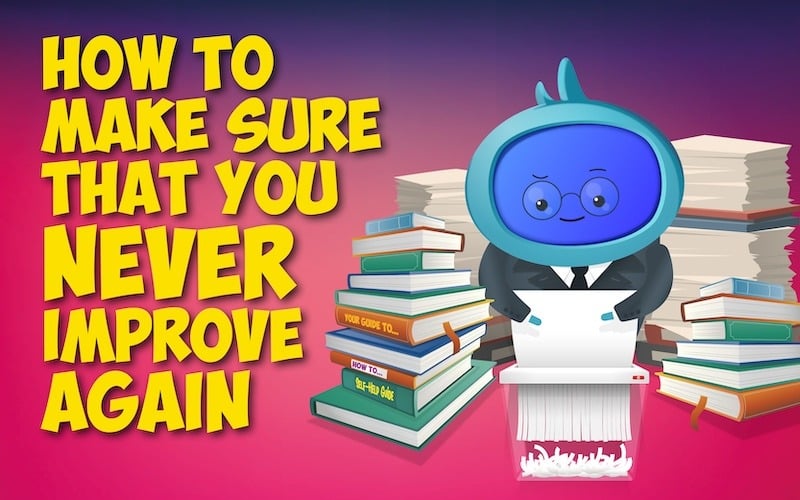If you’re sick and tired of constantly growing as a person, then you need to know how to ensure you don’t improve. After all, it’s such hard work learning new things, expanding horizons and hitting those goals you’ve set. Much better to remain stagnant and successfully avoid any type of personal or professional development, right?
Tired of the constant pressure to improve, and would rather stick to the status quo?
If that sounds like you, then you’ve come to the right place. This blog contains some useful tips to help you speed up to a lifetime of blissful mediocrity. Let’s get started.
Don’t set goals. If you’re set on avoiding improvement, bin the idea of goal-setting. Goals only lead to trouble, pushing you to be better. They provide direction, motivate you to succeed, and give a measurable framework for growth. They help you focus efforts and achieve meaningful progress. Who needs that pressure? Plus, if you have no targets, you can’t miss them. Just think of all that time you’ll save on writing objectives and tracking progress.
If, for some reason, you’re a coach, and actually want to set goals for others or yourself, there’s a course about it that you probably need to check out.
Never ask for feedback. Why would you want to hear what others think about your work or behaviour? Feedback provides valuable perspectives on performance, helping you identify blind spots, learn from mistakes and continually improve. And you can’t have that, can you? Better to plod along in ignorance – who cares if your boss, colleagues or loved ones have valuable insights that could help you?
If you want more details on how to avoid giving and receiving feedback, best to take this course to know your enemy better.
Stay in your comfort zone. It’s called a comfort zone for a reason. Hunker down and never leave. No challenges, no surprises, no growth, just the same routine every day. If you step outside your comfort zone, you’re only going to be challenged to develop new skills, broaden your perspectives, build resilience and open opportunities for success and fulfilment that you just wouldn’t discover otherwise. Comfort is king when you want to remain perfectly average.
A growth mindset is all about personal development, and the effort you put in is key to how much you’ll get out of it. Find out just how tricky that’ll be by taking this course.
Fear failure. Treat every misstep like it’s the end of the world. Ignore the fact that embracing failure is crucial for growth, because it provides invaluable learning experiences, encourages innovation and builds resilience. Also disregard that when you embrace failure, you can learn from those mistakes and refine your approach for next time. Instead, fear failure so much that you are too scared to try anything new. And if you don’t try, you can never mess it up.
If you’re going to fear failure, you’ll probably want to avoid this short eLearning course. It’s all about psychological safety and how failing once in a while will help you grow.
Ignore all learning opportunities. Colleague offering to teach you a new skill? “No thanks”. Invite to attend a workshop or seminar in your sector? Pfft – that sounds like a trap set by the ‘personal development’ police. They say that embracing learning opportunities is vital because it helps you continually grow, makes you more adaptable, broadens your perspectives and opens doors to new possibilities and achievements. But if you feel like your brain is already full up, then swerve these opportunities and stay gloriously ignorant. Sod progress.
However, it’s hard to avoid continuous learning. You learn new skills every day, often without realising. Best to understand this process a bit better, and you can do that by taking this course.
(Mis) Understanding how you learn. Why bother wasting your time trying to understand how you learn? After all, knowing your learning preferences will only lead to clarity about how you process information, which in turn will make it easier to tackle new challenges and adapt to them more quickly. Do you really need that? All it’ll do is make learning more efficient and satisfying when your real goal is to struggle aimlessly with it.
And don’t even think about self-reflection, either. If you gain insight into your strengths and weaknesses, you might actually improve the skills you already have and boost your confidence. Worse – you could even avoid common mistakes by applying the correct techniques that match your learning preference. That rut you’re stuck in is much more exciting, probably.
But the main downside, lest we forget, is that understanding how you learn can actually make you more adaptable, and not just at work, either. Shudder. Better to stay stubborn, frustrated, and ignore opportunities for growth. Who needs progress when staying bang average is so much simpler?
Let’s wrap this up.
There’s no better way to avoid personal growth than by rejecting those tools which lead to improvement. Dangerous tactics like setting goals, seeking feedback or stepping our of your comfort zone can lead to becoming better, rather than remaining exactly how you are. Learning is a sort of trap that can lead to progression and fulfilment, so if you’re fully committed to blissful ignorance, you’d better ignore everything that can help you grow.
Stick to these tips religiously if you’re committed to a life of mediocrity. Remember, understanding how you learn is the final nail in the coffin, because once you get it, there’s no going back.
Or y’know, ignore all of this stuff and become a better you instead. It’s really your choice.
Want to know more?
If you're keen to know more about online learning, why not check out our unique, engaging eLearning content? It covers everything from leadership and people management to health & safety and compliance! Try iAM Learning for yourself - get started today!

